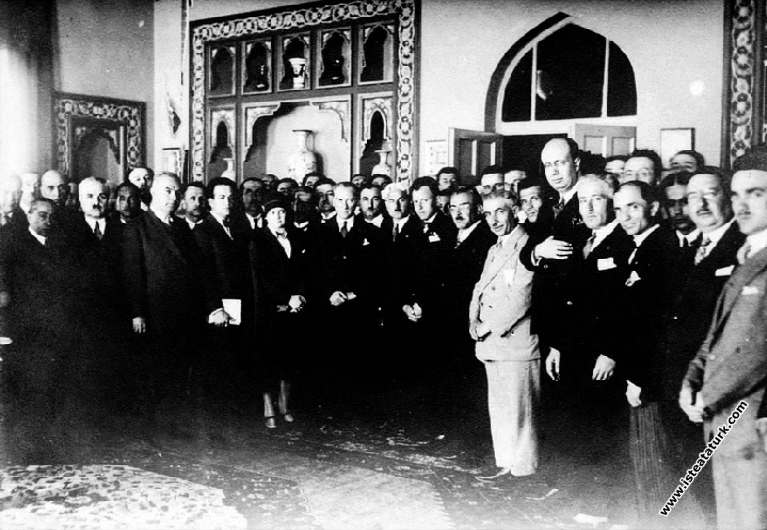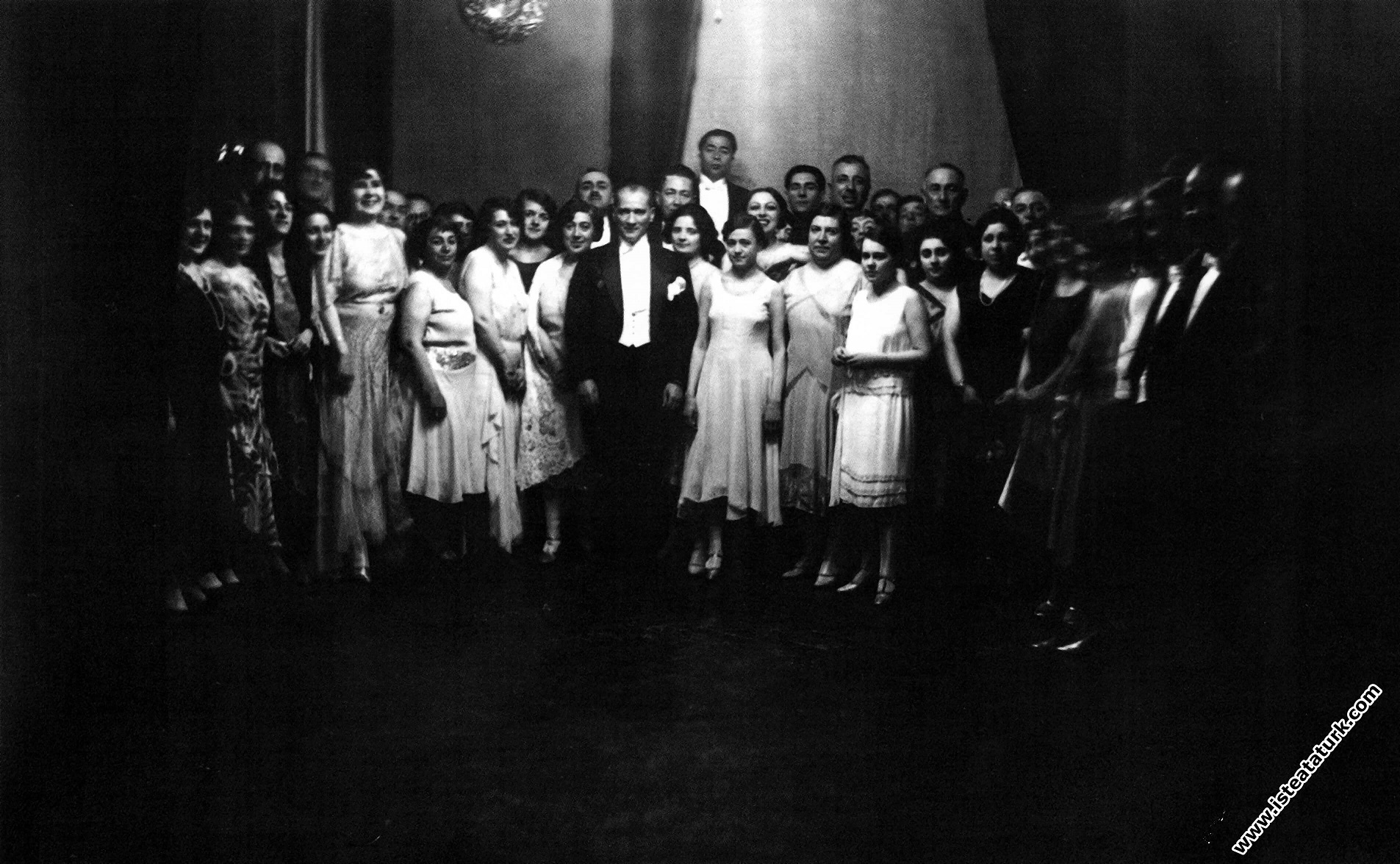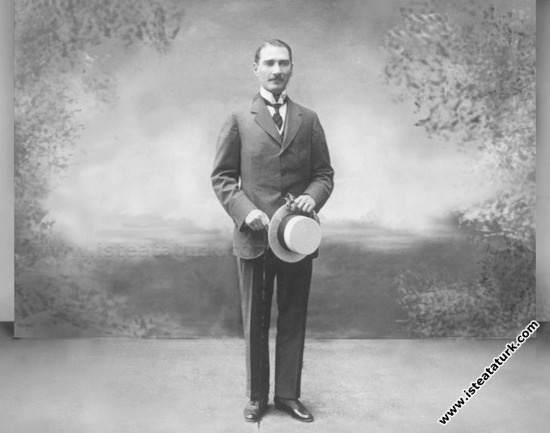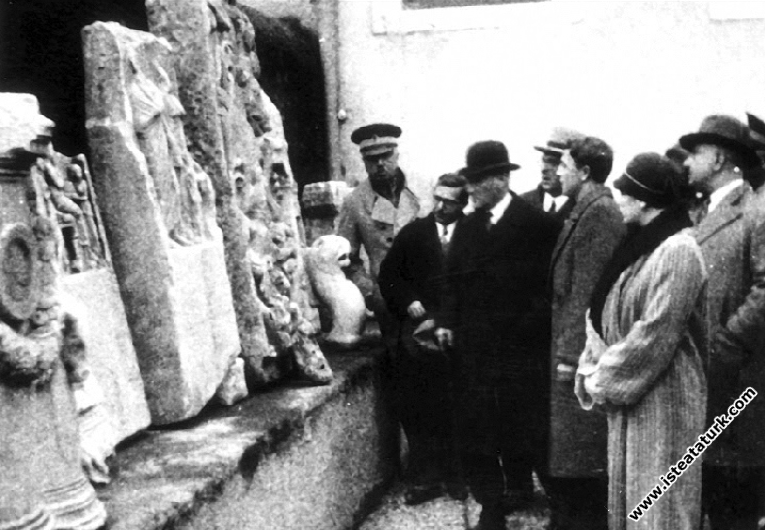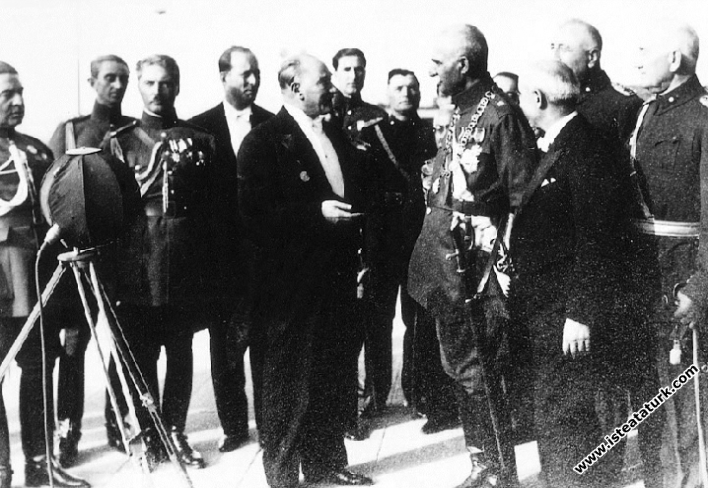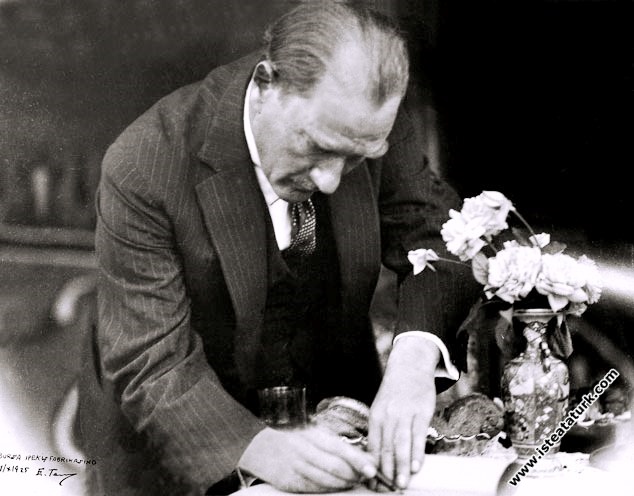
Our Poetry and Atatürk's Language Revolution
Character Size
Our Poetry and Atatürk's Language Revolution
OUR POETRY and ATATÜRK'S LANGUAGE REVOLUTION
The material of poetry is language. The poet realizes his art by using language. However, language also becomes the theme of poetry from time to time. For this reason, many poems were written, the theme of which was the Turkish language. Atatürk's Language Revolution was also mentioned in such poems, and various ideas were put forward on this subject. Here in our article, we will evaluate Atatürk's Language Revolution through poetry.
Entrance
Turkish poetry sometimes chooses and processes Turkish as its subject. The first example of this is Ziya Gökalp's poem “Lisân” (Gökalp,1918:30). Starting from this first poem, there are hundreds of poems written on Turkish in Turkish Literature (Kolcu, Yavaş, 2006). In these poems based on Turkish, our language is handled and processed in almost every aspect. In this paper, we will deal with the subject of “Atatürk's Language Revolution” in poems written on the Turkish language.
A tatürk and the Language Revolution
Atatürk ordered the establishment of an association called “Turkish Language Investigation Society” on 12 July 1932 in order to save our language from the yoke of foreign languages, to bring it to its own unity, to reveal what Turkish language is up to by conducting scientific studies. (Ünaydın, 1954:9-11) This association later changed its name to “Turkish Language Institution”. Thus, the period of “conscious” work on the Turkish language begins. This is a serious step taken after the Letters Revolution for the realization of the Language Revolution. Under the leadership of Atatürk, language congresses are held at Dolmabahçe Palace every year. September 26 is celebrated as “Language Day” every year. Efforts to refine the language increase. According to Atatürk, “The Turkish nation, who knows how to protect its country and its high independence, must also save its language from the yoke of foreign languages.” (Korkmaz, 1991: 190) These efforts gave birth to the Language Revolution and became the subject of our poetry. İshak Refet Iştımman evaluates the Language Revolution as the salvation of Turkish and wrote his poem "While Turkish Language is being Saved". (Işıtman, 1934:78-80) He deals with the problem of the purification of Turkish in his poetry with the technique of "mutual conversation". Irradiation:
“The Turkish language is being saved;
The Turk finds himself;
In his poem, which he started by saying:
“-How is it to speak Persian without Arabic? to the question:
- The best examples are found in the villagers…” he answers.
The addressee to Işıtman, who is of the opinion that "every word has a Turkish language":
“- Come on, tell me this with only Turkish words”
He gives the following couplet:
“What is the state of your reftar as if you are khubup?
Acep nesimi, are you good at seher? 1
Isitman translates this couplet spoken by his interlocutor into Turkish as follows:
“- Are you created from the inspiration of your walk like a work”
The interlocutor who does not know the meaning of the word "inspiration" asks, "What is your inspiration?" he asks. I also radiate:
“-Whatever I am, inspiration is;
Nesim is Turkish;
The Turkish word is the Turkish voice…”
he replies. However, the interlocutor asks that this is "making up" and whether it will work with fabrication. Isimman gives the following answer:
“Do bats see?
In the sun in the diary... There is no fitting, there is a dead end...”
İshak Refet Iştımman cites Divanü Lugati't – Türk as the source of pure Turkish words. His interlocutor asks if he used to say "oragut" for "woman" in the Divan, and now he will say "oragut". When Isitman states that "oragut" is "avrat", he argues that not a single sentence can be written without Arabic or Persian, and nothing can be done with fabrication. Isitman, "They say it's Ottoman, because it's a fabrication." gives the answer. He ends his poem with the belief that Turkish will be saved and the Turk will find himself:
“The Turk is coming back to himself The Turk is coming back to himself
Arabics and Persians are fading out one by one;
European words cannot enter the Turkish language either;
A single word of the Turk cannot be remembered by his hands”
It can be said that this poem of Işıtman is the first poem written on the Turkish Language Revolution.
We see that Behçet Kemâl also supported the efforts to purify and reintroduce Turkish, which was carried out with the Language Revolution, in his poem "Language Feast":
“Like a rose shedding all its thorns
Like a heart filled with high self-emotions
The Turkish language opens, develops, dissolves...
The word - the word means, the feather - the feather gives itself
Turkish wings to Turkish feelings
Endless floors of those art skies
Let it open! We will arrive to take our place....
We will establish a new “Ankara” in art too!” (Caglar, 1934:25)
With Atatürk's personal efforts, the Language Revolution begins to bear fruit and Turkish is simplified. Considering this new structuring in our language as "Ataturk's Turkish", Işıtman sees it as the "liberation of Turkish" and applauds:
“The bee is a clear Turkish, this is the Turkish itself.
In this work, we are in front of the universe, echo
Clear language like water, understand like this, know like this
Your native language is not mixed Turkish
This is the language Atatürk's Turkish
This is the voice of Turkishness in emotion and thought.
This language is the language of the birds, this is the language of the waters
The Turkish language is being saved, may the Turkish hand be happy” (Işıtman, 1935:27-28)
Münir Müeyyet Bekman supports the Language Revolution initiated by Atatürk with the following lines:
“We lit an unquenchable fire on the way to the goal.
The roots of the revolution are gushing left and right
We see the trace of the self in the soil we dig
We weave the ideal, we knit the ideal.
Our self is Turkishness, it does not develop into any department.
We die to reach the conclusion
We run like the wind to the goal shown
We think in Turkish, we speak Turkish.” (Bekman, 1935:97-98)
Ahmet Kemâl Vural, who stated that with the Language Revolution, there was a return to the language and essence, and that we owe this to Atatürk:
“How can it not touch the sky now, the head of the Turk,
Fame ends... Now the language war of self...
Returning to one's own language means: returning to one's essence...
It means returning to Atatürk's honorable word...
The value of the Turkish language is much deeper than any other language.
We run after you, your sun-faced Leader
The joy that flutters within us takes wings.
Because the heart of the nation is burning for its own language…” (Vural, 1935:97)
reveals it in his verses.
That a language war was started with the Language Revolution:
“There is war, war again! unjustly until yesterday
To the grieving hands that find a place between us,
Longing for your own language wholeheartedly;
Today we declared war on Arabic and Persian.
We will uproot the tongue of the hand,
We will add the essence of our language instead.” (Day, 1935:100-101)
Mustafa Gündüz, who draws our attention by saying, calls everyone to this war:
“Friend: walk towards your own tongue, approach, there is
And know that after this, there is a war with the hands.”
Raif N. Giray, who said that Turkish is the source of culture for the Turk, who was born from his homeland, Central Asia, later described the loss of freedom:
... ran around in the Arab country, in the province of Fars,
From time to time he opened his hand to the languages of the western homeland;
He said a mixed language he gathered from here and there,
The villager of the Turk told his squire to learn this;
Huge chunk of this foreign language pondered,
How many young generations have bleached their hair for this cause? (Giray, 1935 :99-100)
reveals it in his verses. Giray, who tells how many centuries the Turkish nation has mourned because of this, explains that we owe the return to the essence in language to Atatürk:
“O language born from the middle of Asia, from the Motherland!
The language that isolates the universe of generosity!...
You are the gift of Atatürk, the word that guides;
If Turkish means: you. You are the Turkish essence.”
Ziya Atılgan, in his poem "Turkish Language", which he wrote on the occasion of the Language Day, states that the aim was achieved with the Language Revolution:
“We threw out the Arabic Persian word from our own language,
We understood the essence of the purity of the Turkish language,
A language that is pure in origin and universal in origin,
O Turk, know that your language is more beautiful than all languages” (Atılgan, 1935:101-102)
After presenting it with a quatrain, he invites his citizens to contribute more or less to the Language Revolution:
“To your greatness your above-ground hook,
I don't know if he wants the value of his tongue.
In this important war, he should take homework, a lot, little;
Citizen, speak Turkish, understand Turkish, write Turkish.”
We learn what is aimed with the Language Revolution from Orhan Cura's poem:
“In every war, the horse does not neigh and fight spear to spear.
Today we are in the middle of the most important war.
After that, foreign words are not appropriate in the Turkish province.
We stand behind a high ideal that calls itself Turkish, its own language.” (Cura, 1935:102)
The Language Revolution has taught and made everyone accept the following truth:
“Speaking Turkish is what suits every citizen.
To speak in pure Turkish is to reach the villagers.” (Recep, 1935:103)
Right next to our intellectual poets, we see our folk poets writing poems supporting the Language Revolution.
Âşık Memet is one of them and he wrote two poems for the Language Day. (Kolcu, Yavaş, 2006 :258-259) The poet, talking about the Language Revolution and Atatürk's contribution to the Language Revolution, says the following:
“Happy Nation Language Day
We got our mother tongue today
Arab's Beginner, we threw your tongue
We spoke Turkish with me today
It is always the Turkish son who stands in the Turkish province.
Our own way is Atatürk's way
Our heart is full of language joy
Today, we are united in the official peasant language” (Memet, 1935 :104)
With the death of Atatürk, the Language Revolution continues, but the studies gain a different dimension. Pure Turkishism leaves its place to pure linguistics. A Turkish language that is completely Turkish is pursued. This new situation also finds a place in our poetry:
“I don't know Ottoman
Neither Arabic nor Persian
My mother tongue is Turkish
Rooting for centuries.
Ilgit
My heart-to-heart enthusiasm
I overcome obstacles
In public smoking narration.
Our land opens in Turkish
Every branch smells Turkish
We are the bee of the bee tongue
As long as your meal is self-contained.
We are nationalist, there is nothing beyond
Turkish words have no end
Ataturk is dead
As the language revolution
My mother tongue is Turkish
muddy day high
I exist, my Turkish, my freedom
Al is crescent-star on the flag.” (Ertuğay, 1971:19)
However, there are also those who oppose the Language Revolution. The way of purifying the language, purifying foreign words and deriving new words, which is a requirement of the Language Revolution, is described as "Fictionalism" by some and is opposed to the Language Revolution. For example, Nail Uçar:
“Speak in mother tongue, write in mother tongue
Made-up language doesn't fit your language
My folk songs, my anthem, they're all in him
My mother's lullaby, her tongue is in it
I don't know probability, I don't say detect
This is not my language, I wouldn't call it Turkish
I sucked my tongue from my mother like milk
Made-up language suffocates my mother tongue.” (Ucar, 1979:32)
Another criticism on the same issue comes from Asaf Hâlet ÇELEBİ.
“Leave me alone, donkey
leave me alone mr curler
lady ividi
my home
my streets are forbidden to you
you are not mine
harput of my dreams
my wife
my revenge
put all your importance in your sack
go scare other naughty kids
to another door” (Celebi, 1983:15)
He opposes the consolidation of Turkish and therefore the Language Revolution.
The Language Revolution, which is the path followed in finding the self-identity of Turkish, continues to exist in spite of everything. Fazıl Hüsnü reveals this fact in his poem "To Exist with Language":
"When I say independence
Our independence disappears
disappears
When we say freedom, it is our freedom.” (Daglarca, 372)
Conclusion
The Language Revolution is a serious step in the purification, purification and self-finding of the Turkish Language. This step is treated as a subject in poems written on Turkish. The reflections of the Language Revolution are very important in terms of Turkish Language history. In this paper, we tried to reveal this importance through poetry.
1 The correct spelling of this couplet should be:
“What is the state of your reftaar as if you are hubub?
Are you better than Aceb nesîm-i seher?
(Your walk is like the blowing of the wind, what is this?
Were you created from the morning wind?)
Source
Atılgan, Ziya, Turkish Language, Turkish Language, P.13, İlkteşrin 1935.
Âşık Mehmet, For Language Day (2), Turkish Language, İlkteşrin 1935.
Bekman, Münir Müeyyet, Language is the Foundation of Being, Turkish Language, P.13, İlkteşrin 1935.
Cura, Orhan, For Our New Language War, Turkish Language, P.13, İlkteşrin 1935.
Our Poetry and Atatürk's Language Revolution 159
Ages, Behçet Kemal, Language Day, Turkish Language, P.10, First Term 1934.
Çelebi, Asaf Hâlet, The Language of Istanbul, Turkish Literature, p.120, October 1983.
Dağlarca, Fazıl Hüsnü, From the Turkish Language Association Koçaklama; Existing with Language, Contemporary Turkish Language, P. 8.
Ertugay, Celâl, Varol Turkish My Freedom, Turkish Language, P.241, October 1971.
Giray, Raif N., Our Language, Turkish Language, P.13, İlkteşrin 1935.
Gündüz, Mustafa, There is War, Turkish Language, P.13, İlkteşrin 1935.
Işıman, İshak Refet, Atatürk Turkish, Turkish Language, P.13, İlkteşrin 1935.
Işıman, İshak Refet, Atatürk Turkish, Turkish Language, P.13, İlkteşrin 1935.
Hasan Kolcu-Gürkan Yavaş, Poetry of Turkish, Poems on Turkish in Turkish Literature, Aydın Publishing House, Ankara 2006.
Korkmaz, Zeynep, Atatürk and Turkish Language Documents, Turkish Language Institution Publications, Ankara 1991.
Recep, Our Language, Turkish Language, P.13, İlkteşrin 1935.
Uçar, Nail, Mother Language, Turkish Literature, p. 63, January 1979.
Ünaydın, Ruşen Eşref, Atatürk History and Language Institutions: Memories, Turkish Language Institution Publications, Ankara 1954.
Gökalp, Ziya, Language, New Life, Evkâf-ı İslamiyye Printing House, Istanbul 1918.
Assist. Associate Professor. Hasan Kolcu , Kocaeli University, Faculty of Arts and Sciences. Lecturer at the Department of Turkish Language and Literature.
Source: Kocaeli Üniversitesi Sosyal Bilimler Enstitüsü Dergisi (16) 2008 / 2: 150-159
